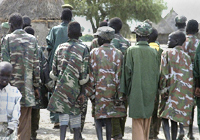• The world has become dramatically more peaceful since 1992, according to the Human Security Report. The number of wars, coup d’etats, and acts of genocide has declined by 40 percent. Weapons sales between countries have dropped 33 percent during the same time, and the number of refugees has diminished by 45 percent.
• The best story of reconciliation and forgiveness in 2006 arose not between two rival countries or militias, but in a small Amish town where a gunman shot  five girls to death in a schoolhouse. The community of Amish Christians, whose girls were lost, had forgiven the man by that evening. In fact, they were discussing ways they could help the family of the killer, a non-Amish man who lived nearby. "They were planning to send a contingent over, perhaps bringing some food…" Marie Roberts, the shooter’s wife, sent a letter saying she was "overwhelmed by the forgiveness, grace and mercy" shown to her family, but to the Amish it was simply their nature as Christians, "Because Jesus forgives us, we forgive others."
five girls to death in a schoolhouse. The community of Amish Christians, whose girls were lost, had forgiven the man by that evening. In fact, they were discussing ways they could help the family of the killer, a non-Amish man who lived nearby. "They were planning to send a contingent over, perhaps bringing some food…" Marie Roberts, the shooter’s wife, sent a letter saying she was "overwhelmed by the forgiveness, grace and mercy" shown to her family, but to the Amish it was simply their nature as Christians, "Because Jesus forgives us, we forgive others."
• Two of the most dangerous street gangs in Boston embraced a quiet negotiated truce which has dramatically reduced bloodshed. The Boston Globe reported that "violence stopped abruptly in July, when a temporary cease-fire took effect and in the nearly four months since, there has not been a single shooting, while overall violent crime where the gang members live has plummeted by as much as 80 percent."
• A new woman Prime Minister of Jamaica, has created common ground for rival gangs where gunfire used to be commonplace. She offers them hope and common purpose. Both sides like her and on this they agree: "She came from a poor background like ours. She gives us promises — schools, development, help for the children.”
• The Basque separatist group in Spain, announced a permanent ceasefire after four decades of armed military resistance with the aim of "promoting a democratic process." Religious leaders in the country urged forgiveness. "The news prompted jubilation across the country, where ordinary citizens said they can hardly believe the end has come for a group blamed for more than 850 deaths," reported The Scotsman in March.
 • In Africa and Asia peace was breaking out far and wide. Cease fire agreements were signed between rebel groups and governments in Sudan, Burundi, Mali, and between feuding countries Nigeria and Cameroon with the help of the United Nations. In India and Uganda, unilateral cease fires were announced and peaceful talks sought by resistance groups responsible for tens of thousands of deaths.
• In Africa and Asia peace was breaking out far and wide. Cease fire agreements were signed between rebel groups and governments in Sudan, Burundi, Mali, and between feuding countries Nigeria and Cameroon with the help of the United Nations. In India and Uganda, unilateral cease fires were announced and peaceful talks sought by resistance groups responsible for tens of thousands of deaths.
• India was again warming toward rival Pakistan this year and calling for progress on Kashmir. Both countries were exchanging ideas and proposals for some settlement to the dispute. By December, Pakistan President Musharraf floated a courageous policy idea calling for demilitarization, self-governance and joint management of the area that has seen thousands of killings from the conflict.
• Five former Soviet republics committed themselves to never acquiring, manufacturing, possessing, or testing nuclear weapons by signing a treaty in September to create a Central Asian nuclear-weapon-free zone.

• Disarmament took place in the Democratic Republic of Congo in June as 1,100 former militia members arrived at transit sites and were given some supplies, money and a certificate for rejoining a community of their choice, under a UN led program. "I have surrendered my weapons at last, to help rebuild my country," Ngajole Lipri, one of the disarmed militia leaders, said. 18 children, including one girl, were among the soldiers.
• And if that weren’t enough peace for you, an ancient Silk Road reopened high in the Himalayas this summer marking the beginning of a new era in trade and diplomatic relations between massive neighbors China and India after more than 40 years of war, mistrust and suspicion.



















